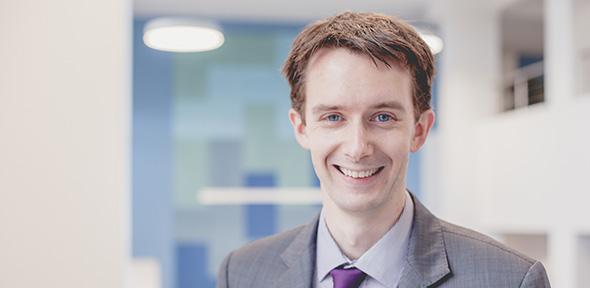
Graeme Ross leads Cambridge’s Immigration and Compliance Team. One of its key roles is to offer advice to people requiring visas to take up job offers from Cambridge.
It sounds corny but the best part of my job is helping people. My team offers expert immigration advice to some of the brightest people in the world. Among them are people Cambridge needs in order to stay ahead in teaching and research.
One of the strengths of Cambridge is its global scope. Research depends on having the right skills. It doesn’t matter whether the person who has that expertise comes from Birmingham or Bogota. Often there’s only a handful of people in the world who have the particular specialist skills needed.
I head the University’s Immigration and Compliance Team. We make sure that the University complies fully with the UK’s immigration rules in its employment of staff from overseas. One of our roles is offering advice on visa applications for current or prospective staff. We’ve never lost a case.
Cambridge has about 3,700 staff from overseas. About 2,000 come from the EU and EEA (European Economic Area). The remainder come from elsewhere in the world and need visas to work or visit here. Visas come in various shapes and forms — and entail lots of bureaucracy.
The UK has one of the most stringent immigration systems in the world. And the rules have got much tighter. More immigration laws have been passed in the last ten years than were passed in the previous 30 years. Keeping on top of the changes is challenging but rewarding.
Visa applications have to be right first time. We’re able to offer guidance on all the stages and documentation required, advising both the applicant and their dependants, if needed. Applying for a visa, alongside all the other things people have to do when moving countries, can be very stressful. We aim to make it less so.
I’m full of admiration for university staff who come here from overseas. They’ve moved to a different country, often with young families, to further their careers. Their commitment is inspiring. I often think “Could I do this?” I’m not sure I could, which makes their dedication all the more impressive.
I was brought up in Aberdeen and didn’t leave Scotland properly until I was 25. At school I loved history and I did a history degree at Stirling University. I went on to take a master’s degree at Aberdeen University, mainly to postpone going out into the real world.
Human migration and diasporas have always interested me. At university, I studied the histories of lots of different countries, but my interest was chiefly in Scottish and American history.
I was fascinated by the factors that drove people to leave their countries, and what their experiences might have been like. We’re all migrants and the identities we create aren’t fixed. We need a greater realisation of this fluidity.
A career in immigration was never my goal. As my mum always said, you never know where life will take you. It was providence perhaps that after graduating I got a job as an asylum caseworker at a detention centre near Cambridge.
I was totally naïve. Caseworkers received six weeks’ training from the Home Office. After that, it was our task to interview asylum seekers who’d been picked up at airports, docks or found in the back of a lorry. Interviewing in that environment was an intense experience.
Refugees’ stories were often compelling. The people we interviewed came from all over the world. Many had terrible tales to tell — sometimes verified, sometimes not. We had to match their accounts against the criteria set out in the 1951 Refugee Convention.
The job was fascinating and I did it for ten years. But once I had my own children, I found it increasingly hard to be involved with cases where parents were simply seeking a better life for their families. I began to empathise with them more and more — what parent doesn’t want their child to have a bright future?
When I applied for an immigration advisor role at Cambridge, I didn’t think I had a chance. I was thrilled to be offered the job and be given an opportunity to do something that’s so positive. Four and a half years later, I’m still amazed to be working for one of the world’s top universities.
I absolutely love my job — no two days are the same. I have a team of four working with me. They’re fantastic and I’m incredibly proud of the work they do. If there are difficult or sensitive circumstances affecting a visa application, we never give up until we get a positive result.
Brexit has led to a lot of anxiety among our EU and EEA staff. Following the referendum result, the University organised immigration advice sessions for them. To date, we’ve helped over 600 EEA staff members to apply for permanent residency — so far with 100% success.
It’s my own view that Brexit is destructive. It’s an unnecessary diversion from the real challenges that face the world, though I appreciate that people have strong views on both sides. While the uncertainty of Brexit continues, my team and I will always be on hand to support staff members who need immigration advice.
This profile is part of our This Cambridge Life series.
